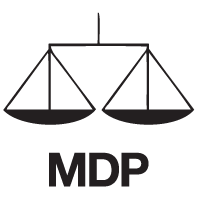President Nasheed’s legal team has stated that the Maldives Criminal Court has effectively blocked the former President’s constitutionally mandated right to an appeal.
The deadline for lodging an appeal expires on 26 March. But the lawyers have been unable to lodge an appeal because, in order to do so, they require the case report from the Criminal Court, and the Criminal Court is refusing to release it.
On 13 March, the former president was convicted of ‘terrorism’ and sentenced to 13 years in jail, following a trial the international community has rounded condemned as unfair.
President Nasheed’s legal team wrote to the High Court on 17 March, stating their intention to lodge an appeal. They also requested the High Court to take action to expedite the availability of the case report. The High Court did not provide a formal response to this request.
On 23 March, the Criminal Court said they had still not released the case report because President Nasheed had not signed the statements of witness testimony.
However, as President Nasheed pointed out on the evening of 26 February when the statements were presented to him, they contained serious errors. For instance, the transcripts of statements did not include many statements he had made in court including his repeated requests for legal representation, request for immediate medical attention in the first hearing, and the description of how he was assaulted before the first hearing.
On the night of his sentencing, when the statements were again brought for his signature, President Nasheed requested to sign the statements in the presence of his lawyers. However, the court denied this request.
President Nasheed has maintained that he will sign all the court papers that accurately record the actual proceedings in the court, and when presented to him in the presence of his lawyers. There has not been any attempt on the part of the Criminal Court to present to him with an accurate record, nor to seek his signature in the presence of his lawyers.
Commenting on the matter, Maldivian Democratic Party spokesperson Hamid Abdul Ghafoor said:
“The Criminal Court is resorting to procedural smoke and mirrors to deny President Nasheed’s right to appeal.”
Statements of International Concern Regarding President Nasheed’s Trial
Amnesty International labeled the trial “a travesty of justice”.
The United States said it is “particularly troubled by reports that the trial was conducted in a manner contrary to Maldivian law and Maldives’ international obligations to provide the minimum fair trial guarantees and other protections under the International Covenant on Civil and Political Rights (ICCPR). This includes the denial of legal representation to former President Nasheed during the first hearing and concerns regarding the lack of impartiality and independence of the judges.”
The United Kingdom said it is “concerned that the former President’s trial has not been conducted in a transparent and impartial manner or in accordance with due legal process.”
The UN High Commissioner for Human Rights said President Nasheed was sentenced following “a rushed process that appears to contravene the Maldives’ own laws and practices and international fair trial standards in a number of respects… This trial began one day after the former President’s arrest and was completed after 11 hearings in 19 days. It is hard to see how such hasty proceedings, which are far from the norm in the Maldives, can be compatible with the authorities’ obligations under international law to conduct a fair trial.”
The United Nations Special Rapporteur on the independence of judges and lawyers said: “Mr. Nasheed’s trial was not only a clear violation of the Maldives’ international human rights obligations under the International Covenant on Civil and Political Rights, but it also made a mockery of the State’s own Constitution. The speed of the proceedings combined with the lack of fairness in the procedures lead me to believe the outcome of the trial may have been pre-determined.”
Background Information
President Nasheed is the Maldives’ first democratically-elected president. He was elected into office in 2008, bringing to an end the 30-year dictatorship of Maumoon Abdul Gayoom.
In February 2012, President Nasheed was ousted in a coup, after mutinying police and army personnel overrun the institutions of state.
In the first round of presidential elections in 2013, President Nasheed received 45% of the vote to Yameen’s 25%. But the Supreme Court constantly meddled in the election – repeatedly annulling, cancelling and postponing the ballot in order to favour the candidacy of Yameen, Gayoom’s half-brother, who went on to assume the presidency.
On January 24 2015, Gasim Ibrahim, who polled third in the first round of the 2013 elections with 24% of the vote, and his party the JP, quit Yameen’s coalition government and sided with President Nasheed and his party, the MDP.
In quitting the governing coalition, Gasim cited President Yameen’s continued attempts to undermine the rule of law and institutions of democracy, including the sacking and harassment of members of the Elections Commission.
On March 8 2015, the religiously conservative Adhaalath Party quit President Yameen’s ruling coalition because of the President’s increasingly authoritarian actions.
Of the four political parties that made up the ruling coalition, only Yameen’s PPM and the small Maldivian Development Alliance remain.
On February 10 2015, Yameen’s Defense Minister, Colonel (Ret.) Mohamed Nazim, was arrested following a power struggle within government. He faces charges of treason.
ENDS
